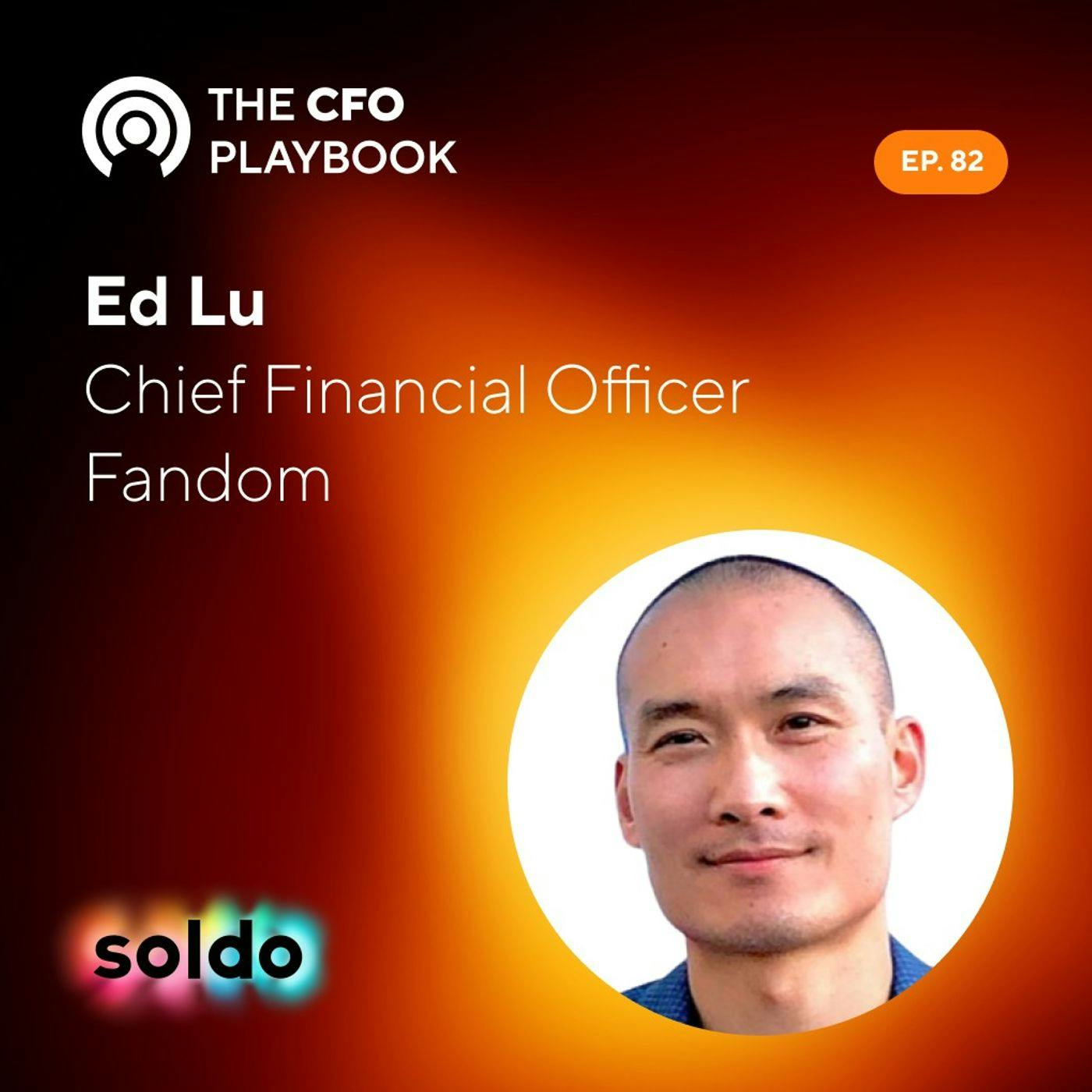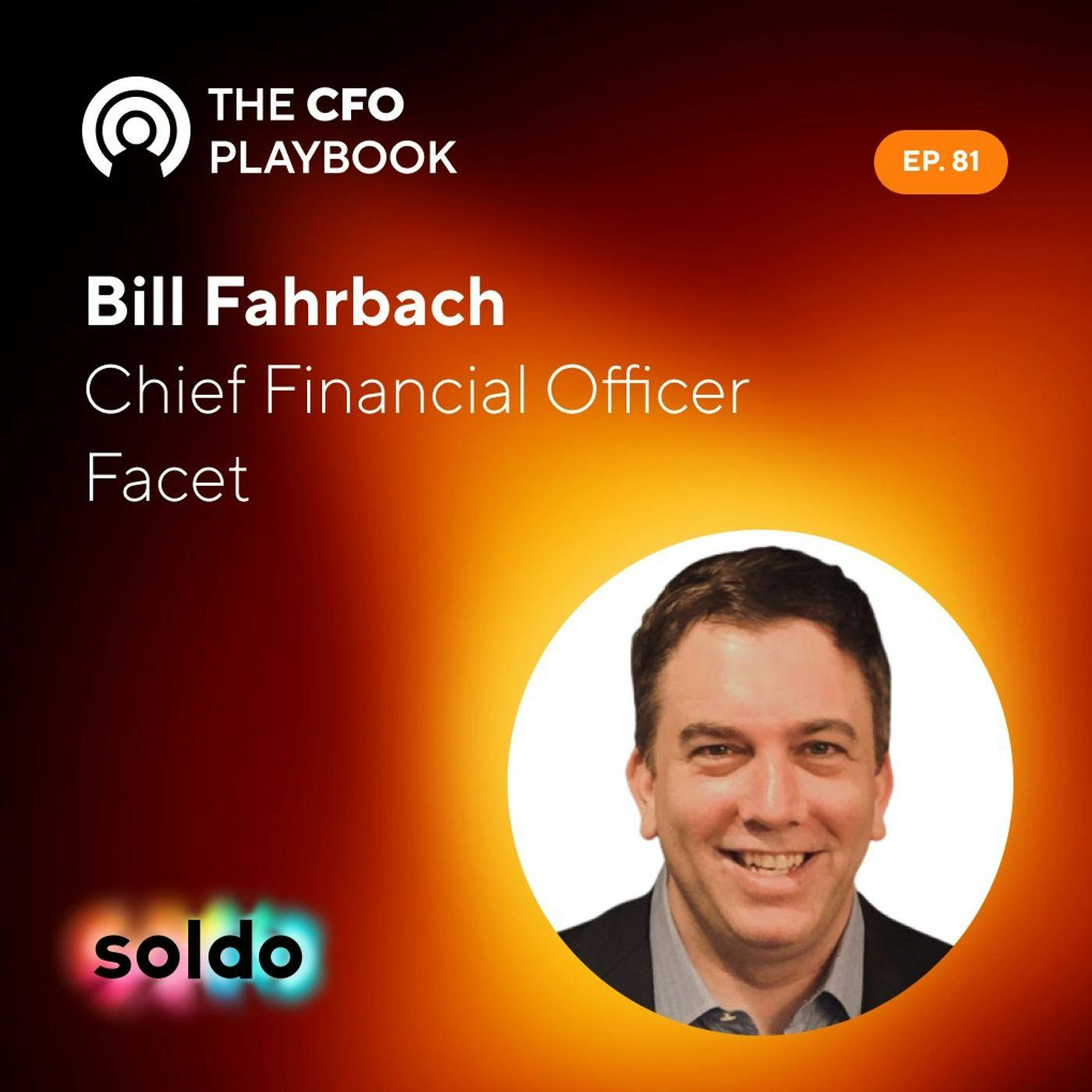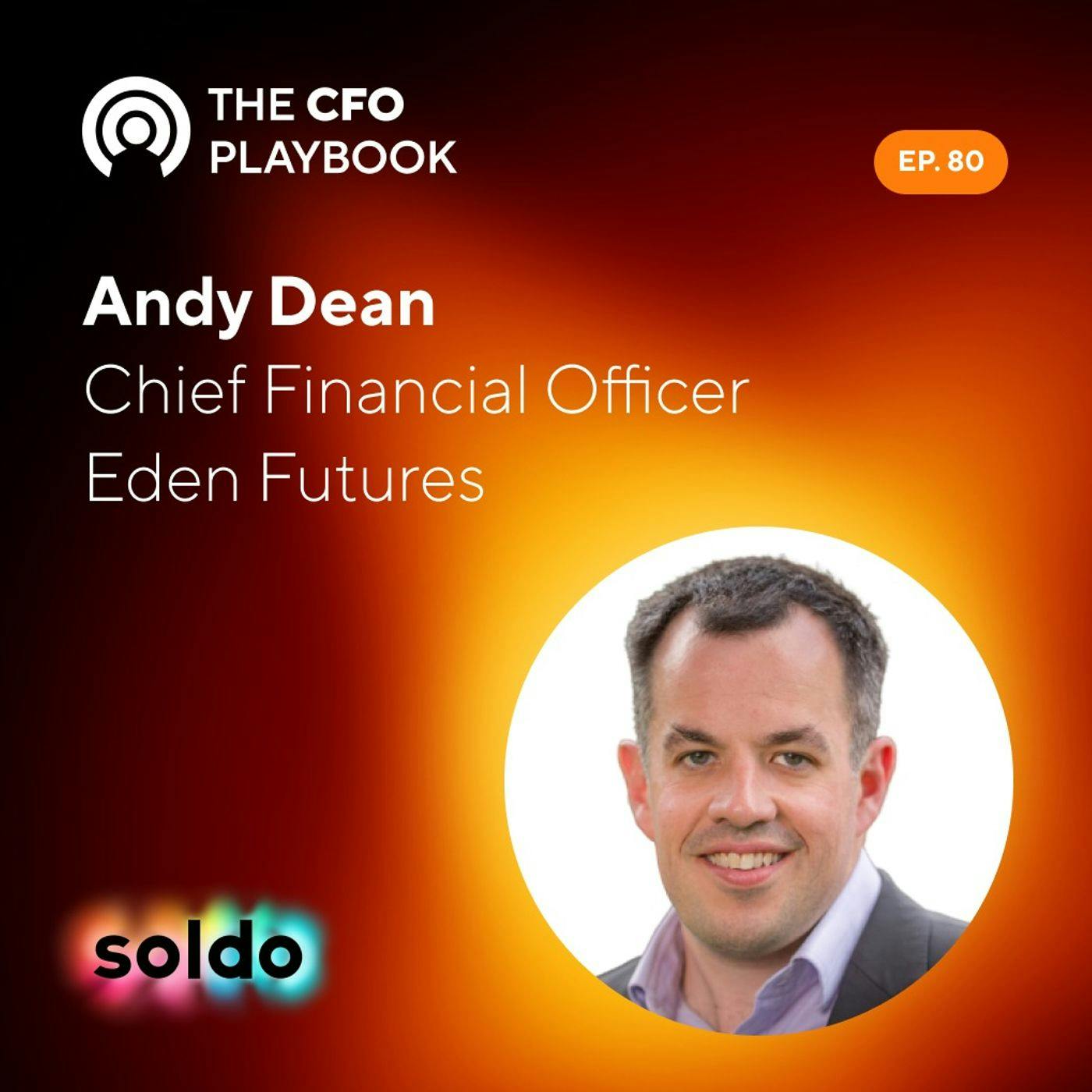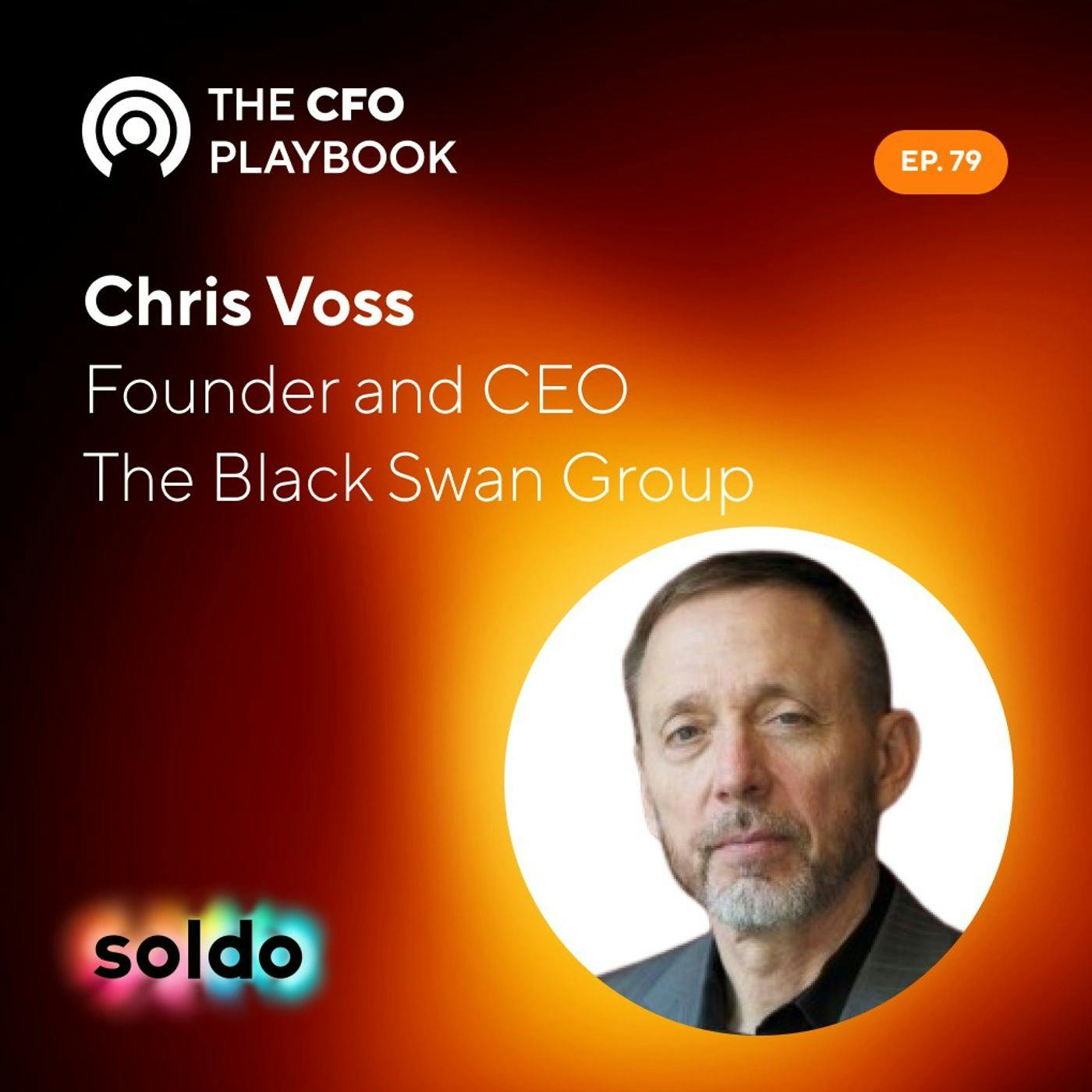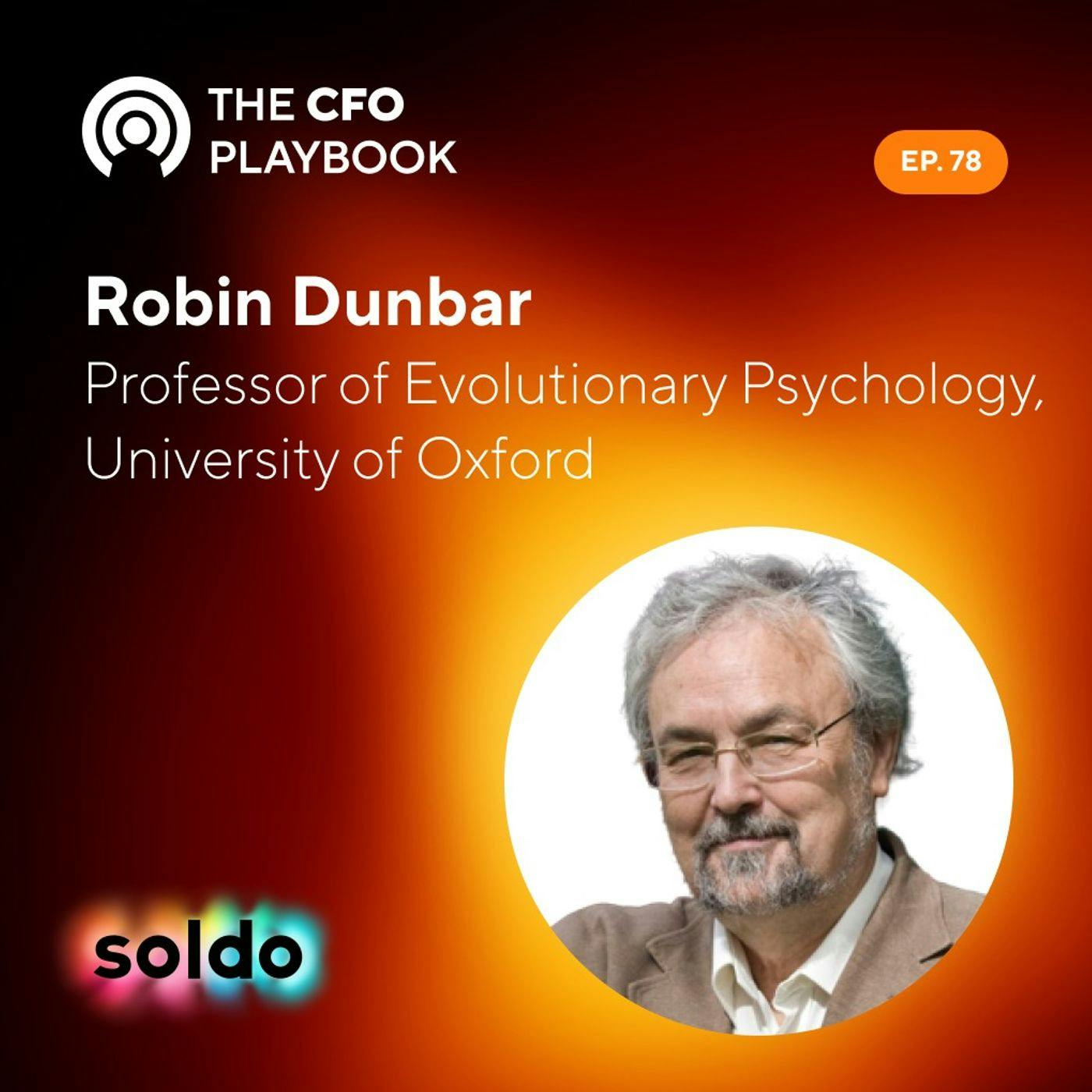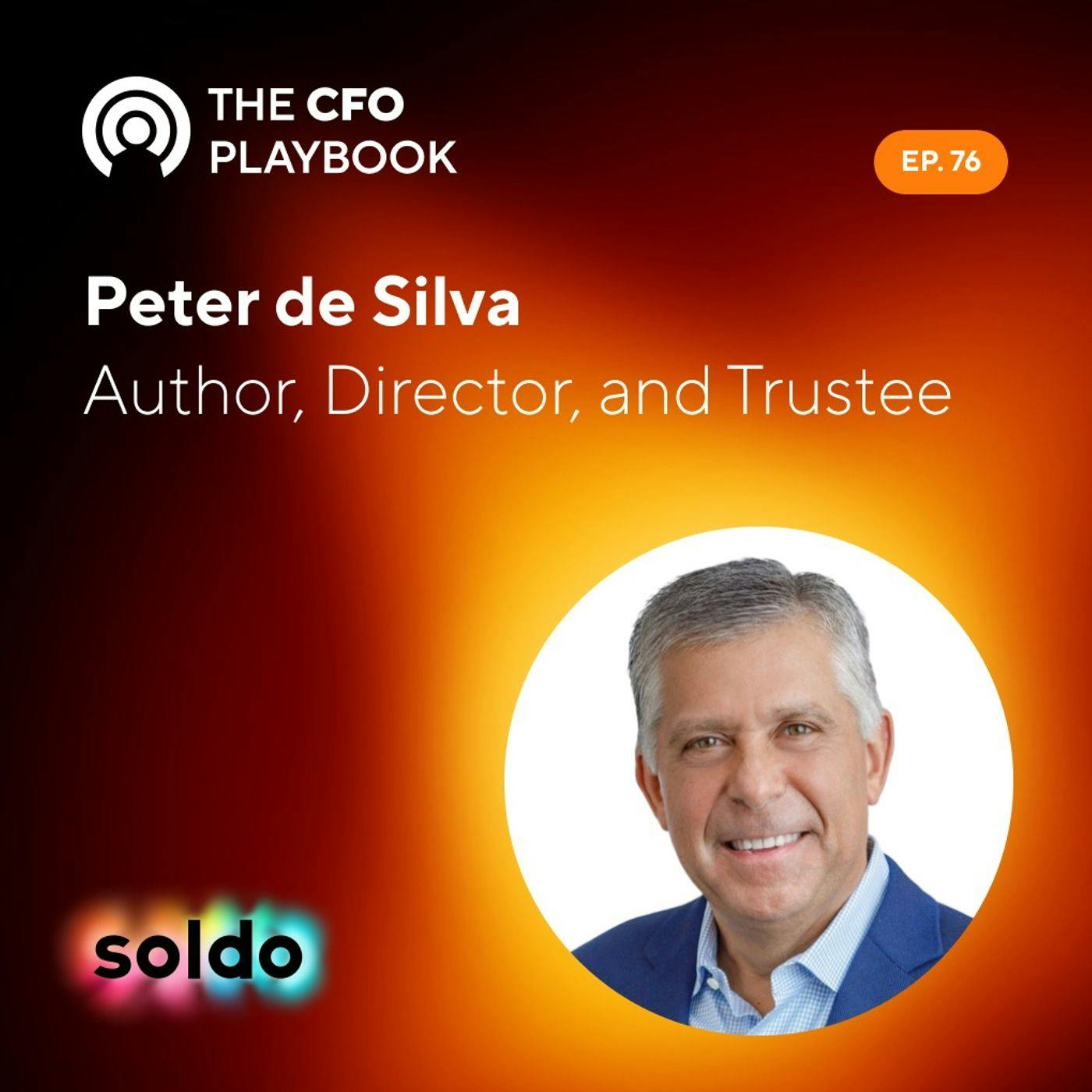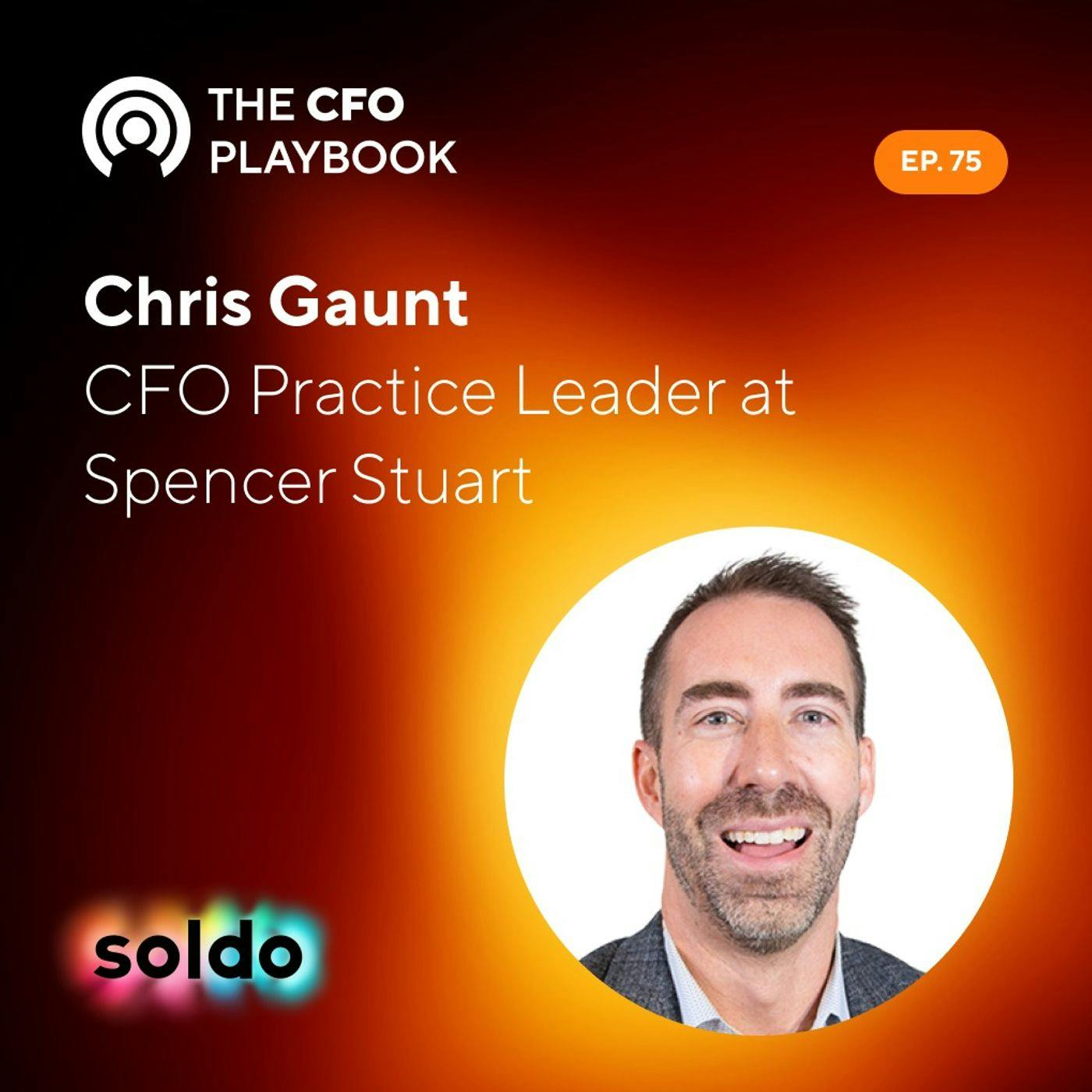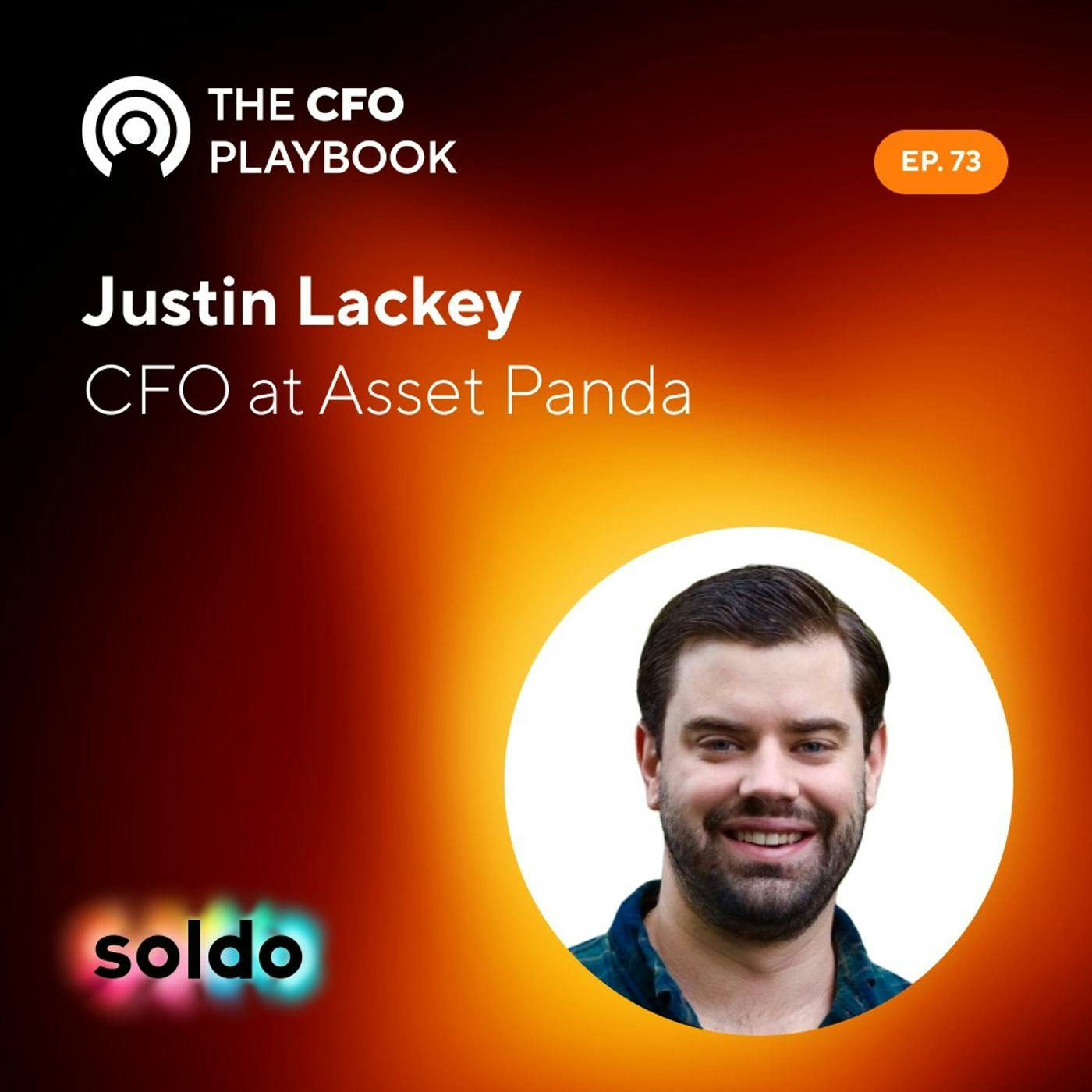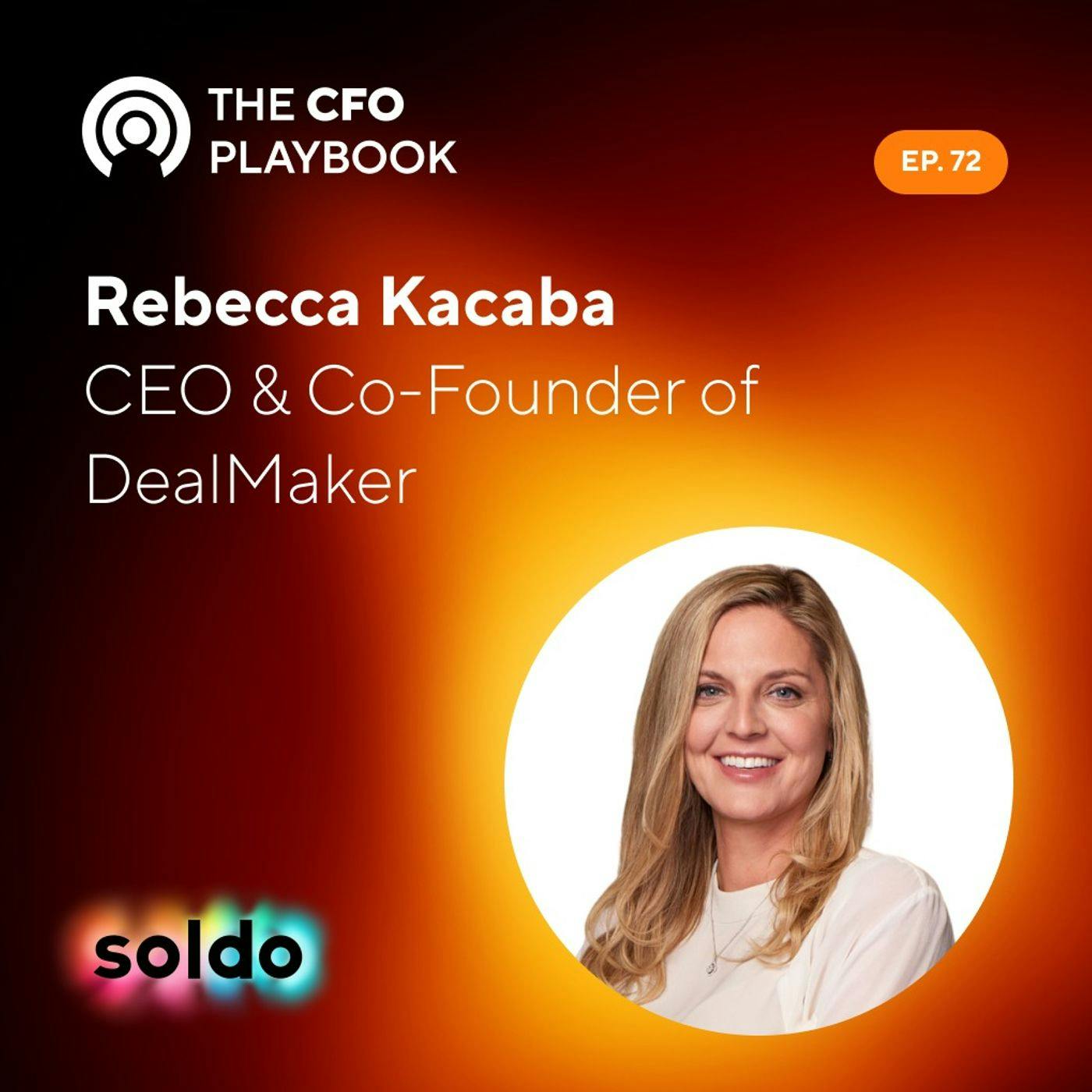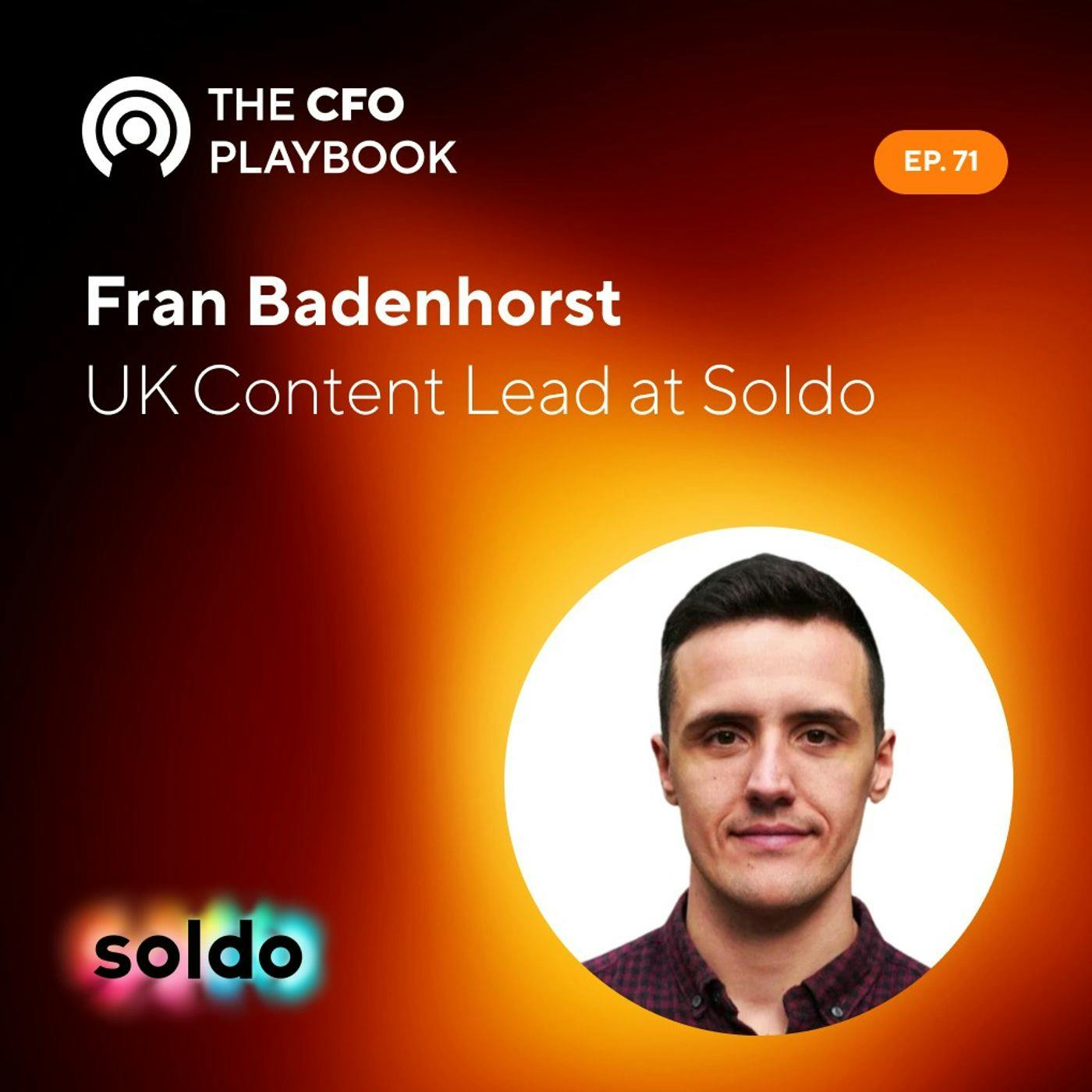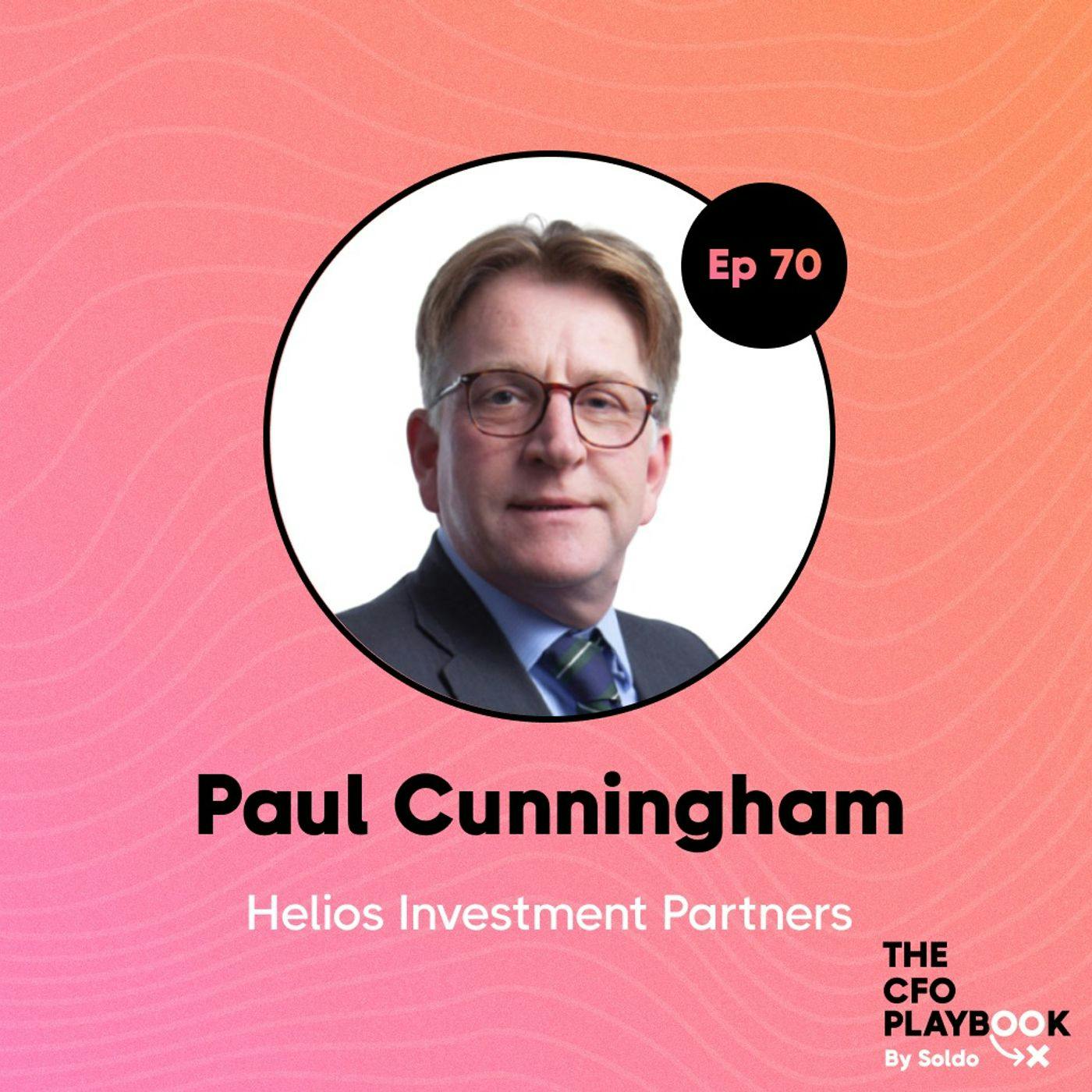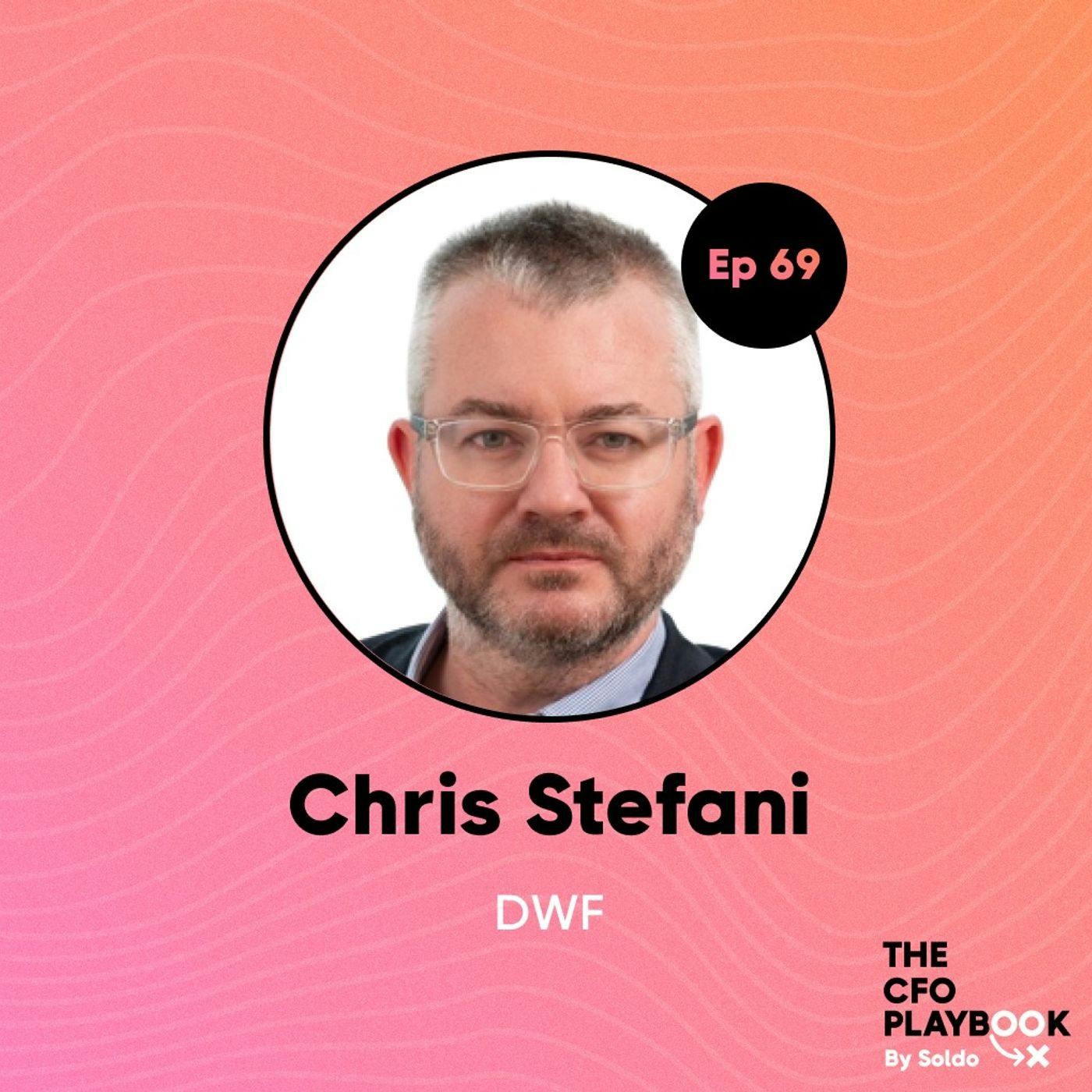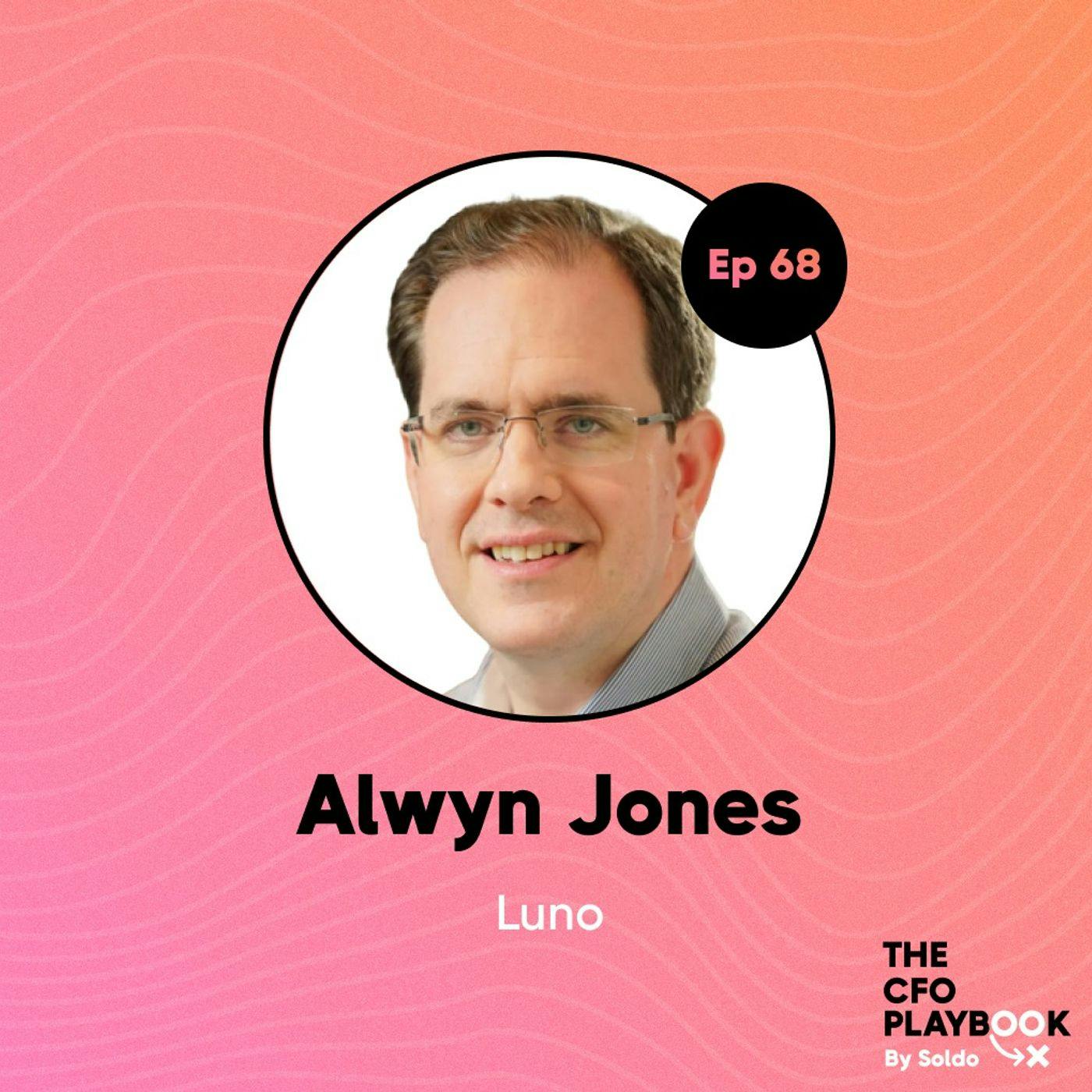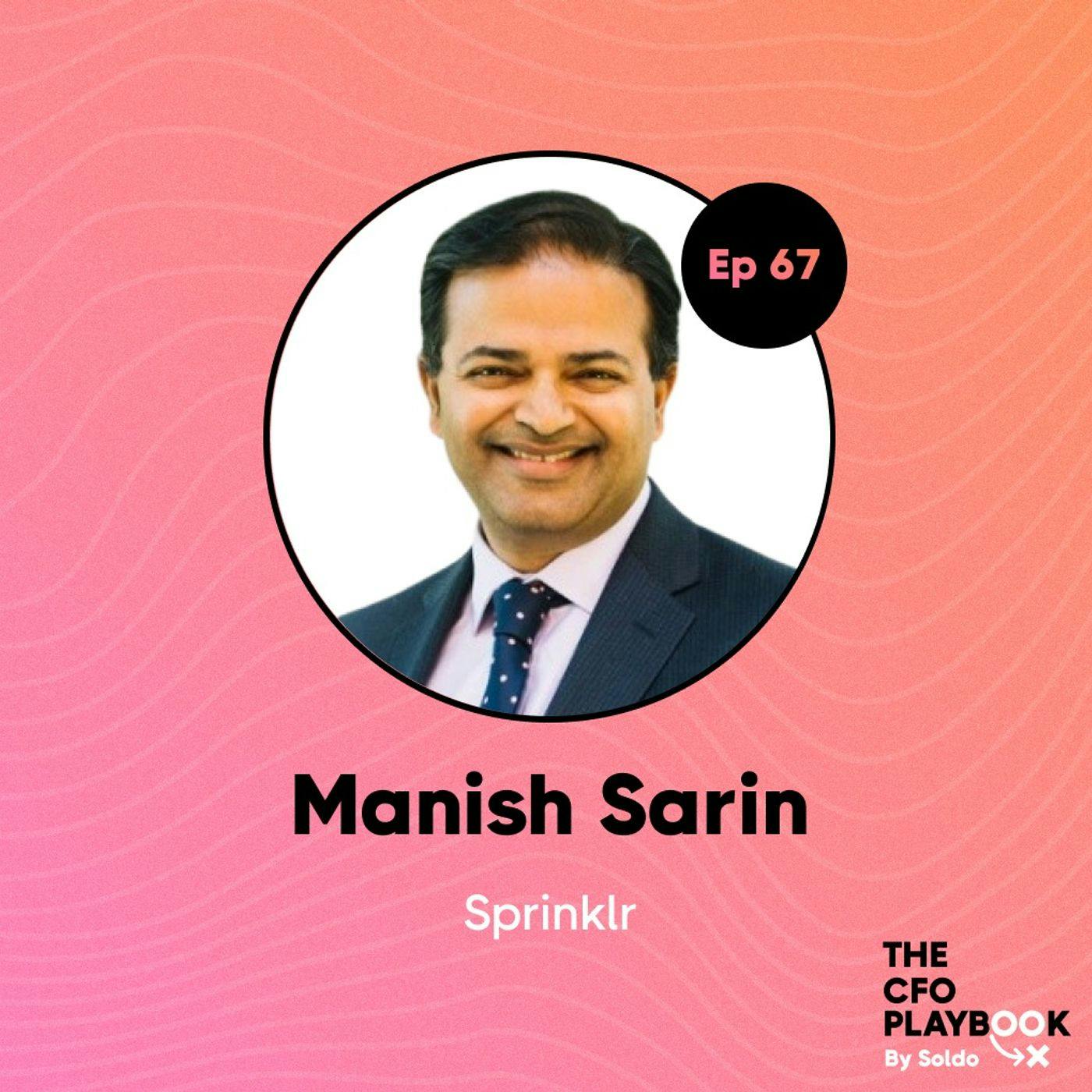Discover The CFO Playbook
The CFO Playbook

The CFO Playbook
Author: Soldo
Subscribed: 33Played: 461Subscribe
Share
© 2024 Soldo
Description
Being a finance leader is no longer just about controlling costs. 2024’s CFOS are trusted business leaders and innovators that drive growth throughout the organisation. Hosted by technology reporter, presenter and consumer champion, David McClelland, The CFO Playbook features interviews with world-class CFOs, finance leaders and founders from some of the fastest growing companies.
The CFO Playbook is brought to you by Soldo.
80 Episodes
Reverse
In the latest episode of The CFO Playbook, David McClelland is joined by Giles Andrews OBE, co-founder of Zopa, the world’s first P2P lending business launched in 2004, to discuss two decades working in FinTech and the role of artificial intelligence in shaping the financial services of the future.
Finding himself as an accidental CFO in the early days of Zopa thanks to an accountancy qualification, Giles progressed to CEO and Chairman and is still an active Board Member, responsible for in excess of £4bn in loans in the UK, and revolutionising the way we look at banking.
Reflecting on the economic storms faced globally over the past few years, Giles offers an insider's perspective on the 2008 financial crisis, revealing how it inadvertently fuelled Zopa's growth by transforming the lending landscape. Now managing a diverse portfolio, from the intricacies of Zopa's operations to Chair of online automotive marketplace CarWow, Giles is all too familiar with the challenges faced against a backdrop of evolving consumer behaviour and digital upheaval.
In a world now captivated by artificial intelligence, he shares his thoughts on the positives in work efficiency and improved user experience in customer service, but expresses concerns about ethics and governance, especially in financial services. Balancing innovation and regulation, Giles highlights the importance of ethical leadership and community spirit to ensure a prosperous ecosystem for businesses of all sizes, whilst embracing advancements in technology.
Chapters -
(0:00:00) - Financial Leadership and Innovation
(0:12:21) - Navigating Financial Crisis and Growth
(0:19:25) - Recent Financial Sector Collapses and Innovation
(0:24:08) - Innovation in Banking and AI
(0:36:06) - Ethics and Privacy in AI Governance
(0:41:54) - Issue of Financial Engineering in Business
About Soldo:
Soldo provides company cards connected to a powerful management platform. Employees use Soldo cards to buy what they need for work without being out of pocket or going over budget. Finance teams use Soldo to distribute money instantly, while staying in control of who spends, how much, where, and on what.
Thousands of businesses, from small to large corporations including Mercedes-Benz, Sony, and Get Your Guide use Soldo to make their business spending simple and efficient.
To find out more or to book a demo, visit Soldo.
Learn more about your ad choices. Visit megaphone.fm/adchoices
In this episode of The CFO Playbook, David McClelland explores how financial management should be embedded into company culture with Richard Dana, co-founder and CEO at Tembo Money.
With a background in corporate finance, Richard shares how he leveraged his interest in travel to co-found the budget-boutique hotel booking platform Doris and Dickie, and the lessons learned from being thrifty in balancing the books from day one with a small team, managing by cost.
Reflecting on his role as CFO at Founders Factory, a unique platform matching leading corporate brands with industry expertise with innovative start-ups to solve specific pain points within their sector. Richard affirms his mantra that founders should focus on being thrifty and making every pound work hard, whilst having a path to profitability and a clear understanding of the financials.
Now on a mission to address the housing affordability crisis, Richard co-founded family lending platform Tembo Money, with the aim of closing the generational wealth gap by broadening access to homeownership. With no CFO currently in place, the focus since its launch in 2020 has been on becoming profitable with a lean team and outsourced accountancy. Richard highlights that despite the crossovers between the CFO and CEO roles, there is a much greater focus on "selling the business" as a CEO, whilst keeping an eye on the money during the early days of growing a new business.
Finally, against the backdrop of the current economic landscape, Richard gives his view on starting a business in a recession; although it's challenging, partnering with established companies and focusing on a product with a real customer need can help mitigate risks. Extending cash runway is crucial for startups, and involves monitoring cash flow, cutting costs, and exploring non-investment funding options.
Chapters -
(0:00:01) - Inside the World of Finance Leaders
(0:13:29) - Building a Finance Startup
(0:22:45) - Funding and Recruitment for Startups
(0:33:57) - Startup Strategies and Acquisition Considerations
(0:43:39) - Liberating Finance for Families
About Soldo:
Soldo provides company cards connected to a powerful management platform. Employees use Soldo cards to buy what they need for work without being out of pocket or going over budget. Finance teams use Soldo to distribute money instantly, while staying in control of who spends, how much, where, and on what.
Thousands of businesses, from small to large corporations including Mercedes-Benz, Sony, and Get Your Guide use Soldo to make their business spending simple and efficient.
To find out more or to book a demo, visit Soldo.
Learn more about your ad choices. Visit megaphone.fm/adchoices
With growth at the heart of the recent Spring Budget, how can companies fuel productivity and accomplish more? On March 13th, 2024, business and economics experts met at the London Stock Exchange to decode the Chancellor’s Spring Budget at an event hosted by Soldo.
This live episode of The CFO Playbook is hosted by David McClelland and features an expert panel -
David Owen, Chief Economist, Saltmarsh Economics
Liz Earle MBE of Liz Earle Wellbeing
Emma Heal, MD at Lucky Saint
Carlo Gualandri, CEO of Soldo
Chapters -
(00:00) - Productivity and Growth Challenges in the UK
(11:54) - Economic Growth and Productivity Opportunities
(21:58) - CFO-CEO Partnership for Business Success
(30:33) - Impacts of AI on Business Operations
(39:40) - AI Technology and Future Industry Trends
(53:41) - Summary of Support in the Spring Budget
About Soldo:
Soldo provides company cards connected to a powerful management platform. Employees use Soldo cards to buy what they need for work without being out of pocket or going over budget. Finance teams use Soldo to distribute money instantly, while staying in control of who spends, how much, where, and on what.
Thousands of businesses, from small to large corporations including Mercedes-Benz, Sony, and Get Your Guide use Soldo to make their business spending simple and efficient.
To find out more or to book a demo, visit Soldo.
Learn more about your ad choices. Visit megaphone.fm/adchoices
Welcome to a new series of The CFO Playbook, brought to you by Soldo.
In this episode, our new host, technology reporter, presenter and consumer champion, David McClelland talks to Baron Anyangwe, a finance leader, about his journey and insights into leadership.
They discuss the importance of flexibility and passion in career choices, the impact of volunteering, and Baron’s own holistic leadership framework. The framework includes principles such as widening perspectives, finding meaningful work, focusing on strengths, and setting milestones for progress.
Baron emphasises the importance of markers and milestones in guiding progress and decision-making, including the 6 Ps of success: Purpose, Principles, Priorities, Progress, Play, and People Skills. The episode also explores the value of playfulness in fostering creativity and innovation, whilst retaining the need for experimentation and adaptability in finance leadership.
This episode also delves into the rise of B Corp businesses and the challenges and opportunities they present for sustainability, reflecting on the concept of liberating finance and the role of finance leaders in driving positive change.
Chapters -
(0:00:01) - Leadership Framework
(0:11:12) - Protect the Magic, Ditch the Rest
(0:18:29) - Play, People Skills in Finance
(0:27:31) - Balancing Long-Term Sustainability in Business
(0:39:13) - Evolving Finance for Sustainable Business
About Soldo:
Soldo provides company cards connected to a powerful management platform. Employees use Soldo cards to buy what they need for work without being out of pocket or going over budget. Finance teams use Soldo to distribute money instantly, while staying in control of who spends, how much, where, and on what.
Thousands of businesses, from small to large corporations including Mercedes-Benz, Sony, and Get Your Guide use Soldo to make their business spending simple and efficient.
To find out more or to book a demo, visit Soldo.
Learn more about your ad choices. Visit megaphone.fm/adchoices
This episode of the CFO Playbook features an interview with Ed Lu, Chief Financial Officer at Fandom, a San Francisco-based gaming and entertainment community platform.
Ed is a gaming and media tech executive with deep finance, strategy and operational experiences focused on VC and PE-backed Gaming and B2C companies. He holds a Master’s in Management Science and Engineering from Stanford University, and a Bachelor’s in Economics from UC Berkeley.
In this episode, Ed talks about the explosive growth of the gaming industry over the course of the pandemic, the impact that generative AI will have on game development, and the ups and downs of the financial investment side of the sector.
--------
Guest Quotes:
“A lot of these [gaming] companies have had to somewhat bootstrap themselves, right? Or like, on a shoestring budget, get something out, show the metrics that the VCs will understand, ‘Oh, okay, I get it. Here's the D1, here's the D3, D7, D28, here's the monetization, here's the ARPU, whatnot. I can now project it out further.’ But they're not getting funding prior, right? And so they've been coming into the game a little later, like sort of post traction.” - Ed Lu
--------
Topics:
01:34 Ed’s background
06:53 The evolution of monetization in online gaming
15:44 Trials and tribulations of game development
20:21 Investment in the gaming sector
30:03 Downsides of VC investing
40:12 Managing employee retention as a CFO
49:24 Reflecting on his career
--------
Sponsor:
This show is brought to you by Soldo, the brighter way to manage business spending and expenses. With Soldo, you can control every expense, track spend in real time, automate financial reporting, and then use those insights to fuel growth. Learn more at Soldo.com
--------
Links:
Connect with Ed on LinkedIn
Connect with Fran on LinkedIn
The CFO Playbook Listener Survey
Learn more about your ad choices. Visit megaphone.fm/adchoices
This episode of the CFO Playbook features an interview with Bill Fahrbach, Chief Financial Officer at Facet, offering impartial and invaluable financial advice and services at an affordable membership fee.
Bill is a strategic Financial Executive and Entrepreneurial CFO/COO with an extensive investment banking background and rounded technology operational experience. With a track record of significant growth, capital raises, and exits, he’s a leader in finance, operations, systems, and legal capacities.
In this episode, Bill talks about the changing dynamics between CFO and CEO, the importance of a healthy work-life balance, and how a primarily remote-first culture affects the pathway to becoming a CFO.
--------
Guest Quotes:
“I think what has changed is, if you think about the CFO role, it's really critically important that you get the right information out to the organization. So, the organization wants to understand how we are doing as a business, and it's not as simple as sort of just saying like, look, here are the numbers, right? There's a lot of color, there's a lot of context. So I would say as CFO, it's been challenging. It's actually pushed probably the limits in terms of like how do you communicate effectively with the employee base, whereas when you're in the office in a physical office, it's more natural, I guess you could say, and more seamless to sort of be having routine discussions with, employees across the board and articulating, you know, the good, the bad, and everything in between and getting that message across. In a virtual environment, what I've found is that the struggle is always finding that balance of how do I get the right message out in the right forums. And not create, let's say, like a drain of unnecessary meetings that people get bored in, right? So, it's finding that balance, you know, articulating the right information, but also giving the right context in a way that employees will be engaged. I'd say that was, that's been the biggest challenge.” - Bill Fahrbach
--------
Topics:
00:38 Bill’s role and adjusting to remote work
03:49 How a remote first culture affects the pathway to CFO
07:51 Educational background
13:19 Dynamics between CFO and CEO
17:53 Facilitating company acquisitions
21:47 Work life balance
24:23 About Facet and IPO
29:18 Best decision he’s ever made
--------
Sponsor:
This show is brought to you by Soldo, the brighter way to manage business spending and expenses. With Soldo, you can control every expense, track spend in real time, automate financial reporting, and then use those insights to fuel growth. Learn more at Soldo.com
--------
Links:
Connect with Bill on LinkedIn
Connect with Fran on LinkedIn
The CFO Playbook Listener Survey
Learn more about your ad choices. Visit megaphone.fm/adchoices
This episode of the CFO Playbook features an interview with Andy Dean, Chief Financial Officer at Eden Futures, providing high quality, person-centered care, supported living and enablement for people with disabilities and support needs.
At Eden Futures, Andy leads the Finance, Service Development and IT teams. Prior, he started his career training with KPMG as a Chartered Accountant, gaining experience within both Audit and Transaction Services. He has since worked for a variety of care providers in social care starting with Craegmoor as Group Financial Accountant. From there he gained broader experience at GKN plc before joining what became Embrace Group in 2012 as Group Financial Controller. Andy helped to manage the recovery and subsequent sale of that business before joining Eden Futures.
In this episode, Andy talks about the current state of social care in the UK, his work as a leader for teams in finance, service development, and IT, and how policies, politics, and technology affect the space.
--------
Guest Quotes:
“ Part of your role, as CFO, is that wide base of stakeholders. You can be talking to your shareholder one day. You can be talking to your lender another day. You can be talking to your insurer. You know, CFOs like me are often responsible for the IT, so get involved in the IT discussions, talking to our customers. So, in our case, our commissioning partners around whatever issue it might be, say fee rates, occupancy. Get involved with the lawyers that are on the contractual side. So yes, it is a varied role. You know, the old adage that 'no day is ever the same' is absolutely right from a CFO perspective.” - Andy Dean
--------
Topics:
01:37 Andy’s background and role as CFO
07:22 Current state of social care in the UK
13:14 Technology in social care
17:43 Employee retention and politics
21:00 Dealing with uncertainties
25:45 Mentorship
--------
Sponsor:
This show is brought to you by Soldo, the brighter way to manage business spending and expenses. With Soldo, you can control every expense, track spend in real time, automate financial reporting, and then use those insights to fuel growth. Learn more at Soldo.com
--------
Links:
Connect with Andy on LinkedIn
Eden Futures Website
Connect with Fran on LinkedIn
The CFO Playbook Listener Survey
Learn more about your ad choices. Visit megaphone.fm/adchoices
This episode of the CFO Playbook features an interview with Chris Voss, Founder and CEO of The Black Swan Group. Previously, Chris was the lead international kidnapping negotiator for the Federal Bureau of Investigation and the FBI’s hostage negotiation representative for the National Security Council’s Hostage Working Group.
Chris used his many years of experience in international crises and high-stakes negotiations to develop a unique program that applies globally proven techniques to the business world. Through the Black Swan Group, he provides training for a variety of businesses and individuals on negotiation skills. He’s also the author of Never Split the Difference: Negotiating as if Your Life Depended on It.
In this episode, Chris and I talk about how he became an FBI hostage negotiator, what a CFO can learn from negotiation, and the three biggest mistakes to avoid when negotiating.
--------
Guest Quotes:
“Really counterintuitive stuff, this thing that we call empathy, you know, we call tactical empathy. It's ability to influence, if you can wrap your mind around what it really is, it works under all circumstances. Doesn't matter, as long as human beings are involved, whether it's a colleague, whether it's a client, whether it's an employee, whether it's somebody you work for, it seems mystical because it really operates on neuroscience and the feelings of being understood. But human beings are wired to be completely emotional. You know, every decision, you make up your mind based on what you care about, which makes decision making an emotional process because your fundamental basis is what you care about. And so then it's just applied emotional intelligence. And you know you can succeed in the boardroom or work with what I learned dealing with a drug dealer or a terrorist.” - Chris Voss
--------
Topics:
03:02 How to become an FBI hostage negotiator
03:41 What a CFO can learn from negotiation
12:52 Three biggest mistakes in negotiation
18:45 Achieving outcomes
22:28 In-person versus digital communication
27:38 Real life stories
--------
Sponsor:
This show is brought to you by Soldo, the brighter way to manage business spending and expenses. With Soldo, you can control every expense, track spend in real time, automate financial reporting, and then use those insights to fuel growth. Learn more at Soldo.com
--------
Links:
Connect with Chris on LinkedIn
The Black Swan Group LTD
Connect with Fran on LinkedIn
The CFO Playbook Listener Survey
Learn more about your ad choices. Visit megaphone.fm/adchoices
This episode of the CFO Playbook features an interview with Robin Dunbar, Professor of Evolutionary Psychology at University of Oxford and Co-author of The Social Brain: The Psychology of Successful Groups.
Professor Dunbar is British anthropologist and evolutionary psychologist and a specialist in primate behavior. He is best known for formulating Dunbar’s number, a measurement of the “cognitive limit to the number of individuals with whom any one person can maintain stable relationships.” His research is concerned with trying to understand the behavioral and cognitive mechanisms that underpin social bonding in primates and humans.
In this episode, Professor Dunbar talks about how evolution affects the dynamics of organizations, the seven pillars of friendship, the impact of work on personal relationships, and the observable changes in a sense of community overtime.
--------
Guest Quotes:
“In a C-suite level, you have to find ways of sharing your time and not micromanaging everything, that's where the disaster comes, I think, because you destroy everything. You try and micromanage the whole of a big organization, not only do you make a hash of that because it's too big, but you also don't have any time left over for your family relationships and so on, and they fall apart. So, you’ve got to trust the people you work with, as it were, below you, in the layers below you to do their job, and that has to be the culture. And, there are places where that happens, you have this sense of trust and obligation and people work willingly, as it were, and overwork, maybe, willingly, not for the money they're paid but out of a sense of pride and obligation to the job they do. If you encourage that kind of attitude again, which used to be much more common, then you don't have to worry about what's going on down below because that's being taken care of in the layers below you. You can sit back and deal with strategy, which is what C-suite folks should be really concerned with because, and sparing yourself enough time at the corners of the day to invest in your own kind of family and social environments.” - Robin Dunbar
--------
Topics:
02:51 Introducing Robin’s book: The Social Brain: The Psychology of Successful Groups
06:35 How evolution affects the dynamics of organizations
11:36 The seven pillars of friendship
18:21 Difference in application for group sizes in a workplace setting
30:32 Generational changes in the sense of community
38:47 The impact of work on personal relationships
--------
Sponsor:
This show is brought to you by Soldo, the brighter way to manage business spending and expenses. With Soldo, you can control every expense, track spend in real time, automate financial reporting, and then use those insights to fuel growth. Learn more at Soldo.com
--------
Links:
Connect with Robin on LinkedIn
The Social Brain: The Psychology of Successful Groups
Connect with Fran on LinkedIn
The CFO Playbook Listener Survey
Learn more about your ad choices. Visit megaphone.fm/adchoices
This episode of the CFO Playbook features an interview with Tom Herbert, Tech Editor at AccountingWEB, the largest independent online community for accounting and finance professionals in the UK.
Tom is a journalist, editor and broadcaster with experience across digital and print publications. For the past seven years, he’s specialized in business, accountancy and technology journalism. He writes and edits news, features, interviews and opinion pieces and also features on a variety of podcasts, videos and webinars as both a host and guest.
In this episode, Tom talks about ChatGPT and the future of AI, the recent Silicon Valley Bank situation, The Tyranny of Expense Reclaim, and his opinions on accountancy stereotypes.
--------
Guest Quotes:
“I think that accountants, the stereotype is, Nigel in the corner office with his spreadsheet, and they're incredibly boring people, like Monty Python and various others have spread this around. But, I actually find accountants incredibly entertaining. I think they're generally very quirky, quite eccentric, and often quite blunt. But, when I pitched up in 2015, after, as you said, a series of events, writing, travel, writing, sports, journalism, like my wife's, yeah, ‘accounting journalism, are you sure?’ But, yeah, I've loved every minute of it, genuinely. It's been great fun.” - Tom Herbert
--------
Topics:
03:54 Chat GPT and AI
10:21 Silicon Valley Bank
14:14 Resumes and trust
18:44 The Tyranny of Expense Reclaim
24:44 Opinions on accountancy stereotypes
--------
Sponsor:
This show is brought to you by Soldo, the brighter way to manage business spending and expenses. With Soldo, you can control every expense, track spend in real time, automate financial reporting, and then use those insights to fuel growth. Learn more at Soldo.com
--------
Links:
Connect with Tom on LinkedIn
Connect with Fran on LinkedIn
The CFO Playbook Listener Survey
Learn more about your ad choices. Visit megaphone.fm/adchoices
This episode of the CFO Playbook features an interview with Peter de Silva, Author, Director, and Trustee.
Peter is an experienced chairman, CEO, president, executive committee member, public and private company director and trustee for national not-for-profit organizations and national charitable foundations. He’s a Former Harvard University Senior Fellow - Advanced Leadership Initiative, and author of Taking Stock: 10 Life Leadership Principles from My Seat at the Table.
In this episode, Peter talks about the importance of successfully cultivating relationships for career progression, the financial impacts of the 2020 ‘meme’ stock craze, and leaves us with his top three pieces of advice for the CFOs of the future.
--------
Guest Quotes:
“If I think about three or four pieces of advice for aspiring financial leaders, I would leave you with this. One, take intelligent risks. I didn't want to move to Cincinnati. I didn't want to move to Kansas City. But I did, and I grew much more quickly. I got way ahead from where I would've been if I sat in my office in Boston. So, take those intelligent risks. Second, and something that has to be learned, you need to hire people that compliment you and challenge you. The leader that hires people that look just like them and marches in line, it doesn't work. You want people who challenge you around that table. And, as long as they do it respectfully and ethically, it's all good with me. But, ensure you find people who compliment and challenge you. Third, constantly challenge yourself to improve. None of us are done learning and growing and we won't be until we draw our last breath because that's the essence of life, is to learn and grow and to develop. And my last piece of advice for everyone is to do what you love and love what you do. And, if you don't, It's time to move on.” - Peter de Silva
--------
Topics:
01:22 Peter’s background
06:12 Early career
09:28 Experience at Harvard
14:38 Meme stock craze
22:56 Peter’s book
25:43 Cultivating relationships
30:40 What’s next for Peter
31:26 Advice for upcoming CFOs
34:00 Learning experiences
--------
Sponsor:
This show is brought to you by Soldo, the brighter way to manage business spending and expenses. With Soldo, you can control every expense, track spend in real time, automate financial reporting, and then use those insights to fuel growth. Learn more at Soldo.com
--------
Links:
Connect with Peter on LinkedIn
Connect with Fran on LinkedIn
The CFO Playbook Listener Survey
Learn more about your ad choices. Visit megaphone.fm/adchoices
This episode of the CFO Playbook features an interview with Chris Gaunt. He is the CFO Practice Leader for Europe, Middle East and Africa at Spencer Stuart, an executive search, board, and leadership advisory service.
In his role, Chris works on a variety of Group CFO appointments for many of the world’s largest publicly traded companies, as well as for private equity-backed portfolio companies. He has a strong international focus, often for clients in emerging economies who wish to access the global executive talent pool. Prior to joining Spencer Stuart, Chris worked with another leading international executive search firm, most recently serving as the Managing Partner of its UK CFO practice. He began his career in the financial leadership search field in the firm’s New York office. Earlier, Chris worked as a management consultant for the Washington, D.C.-based Advisory Board Company. In that capacity, he led consulting teams working with senior executives across industries on their human resources strategy and operations. Chris holds a master’s degree from the London School of Economics and a bachelor’s degree from Georgetown University.
In this episode, Chris talks about the ever changing role of the CFO, the modern challenges of headhunting, leadership as a whole, and the steps you can take to reach the top.
--------
Guest Quotes:
“You need a certain stiffness, a certain toughness, of character to survive the sort of constant battering and the loneliness that is involved in being a CEO. I won't dispute that. I would say that we're seeing, again, an evolutionary change where the command control type of the CEOs of yesteryear are simply no longer in vogue. What we've seen, and the Covid crisis amplified this, is that CEOs today, more than ever, have to demonstrate real empathetic and inclusive leadership." - Chris Gaunt
--------
Topics:
02:08 Introducing Chris
03:11 Current state of CFOs
06:30 Challenges in headhunting
10:11 The skill set of a modern CFO
16:21 Prerequisites for becoming a CFO
22:53 The process of CFO headhunting
27:45 Examples of successful CFO searches
--------
Sponsor:
This show is brought to you by Soldo, the brighter way to manage business spending and expenses. With Soldo, you can control every expense, track spend in real time, automate financial reporting, and then use those insights to fuel growth. Learn more at Soldo.com
--------
Links:
Connect with Chris on LinkedIn
Connect with Fran on LinkedIn
The CFO Playbook Listener Survey
Learn more about your ad choices. Visit megaphone.fm/adchoices
This episode of the CFO Playbook features an interview with Justin Lackey, CFO at Asset Panda, a powerful, highly configurable asset tracking and management SaaS platform on a mission to help the world work smarter.
In his current role as the Chief Financial Officer, Justin oversees revenue operations, pricing, and data analysis, which are all transferable skills brought over from his previous positions as Director of Revenue Operations, and Manager of Pricing Strategy and Finance. Prior to Asset Panda, Justin held four separate financial analyst positions at ACTIVE Network, a premier global marketplace for activities and events. He graduated with a degree in general finance from Texas A&M University in 2017.
In this episode, Justin talks about the importance of maintaining transparency in the new world of finance, navigating risk appetite when conducting business during black swan events, and adapting to and remaining motivated in remote work environments.
--------
Guest Quotes:
“I like to look at everything as a revenue generating role, right? What are you doing to impact revenue? Whether it's a tweak you're making in our sales process, our marketing process, insights you're helping give them, there’s a direct downstream impact on revenue for that. Becoming obsessed with that revenue side of the business, I think is important for any young analyst, any aspiring CFO.”
“I think a really good quality for a CFO, CRO is, can you take a complexity and can you make it digestible, right? That is always the million dollar question of, okay, we have this set, this data set, this preexisting analytics set, right, of historical information. How do I put this into an action item and how do I deliver it so anyone can understand it?”
“I think haste of pivot is super important. Boils back down to that data collection piece of, how long is too long for a project to kind of run its course, right? You have the opportunity to act much quicker based on leading indicators than you could've. It's not all about waiting until seeing the win rate anymore, waiting until seeing total revenue, right? You can kind of grab some of that upfront data, make some pretty educated guesses, and pivot quickly.”
“There's a famous kind of mindset model that talks about the different zones that people can find themselves in. And there's a reactive zone and a proactive zone, along with a waste and a distraction zone, things like that. We spend a lot of time in that reactive zone today, but we're not necessarily using time in the proactive zone that can lead to efficiencies within that reactive zone. What am I doing day-to-day that really could be automated that's taking up a lot of my time, and how do I invest that time back into my personal life?”
--------
Topics:
02:06 Justin’s role and background
07:53 The new world of finance
13:22 Transparency in finance
18:06 Addressing risk appetite
22:08 Black swan events
28:31 Remaining motivated in remote work
33:51 Siege mentality in company leadership
37:33 Tips for success in business
--------
Sponsor:
This show is brought to you by Soldo, the brighter way to manage business spending and expenses. With Soldo, you can control every expense, track spend in real time, automate financial reporting, and then use those insights to fuel growth. Learn more at Soldo.com
--------
Links:
Connect with Justin on LinkedIn
Connect with Fran on LinkedIn
The CFO Playbook Listener Survey
Learn more about your ad choices. Visit megaphone.fm/adchoices
This episode of the CFO Playbook features an interview with Rebecca Kacaba, CEO & Co-Founder of Dealmaker, the leading platform turning all capital raise types into simple ecommerce.
Rebecca practiced law on Bay Street for over 10 years, founded the startup practice group at one law firm, and was co-chair of the Toronto Venture Technology and Emerging Growth Companies Group. Rebecca’s vision and drive have landed her in Lexpert’s Top 40 Under 40 and recognized as one of North America’s most innovative lawyers by the Financial Times. Rebecca led DealMaker to be Canada’s 3rd Fastest Growing Company 2022.
In this episode, Rebecca talks about equity crowdfunding as a go-to method for raising capital, leading and persevering through the global pandemic, and provides advice for aspiring female entrepreneurs as she is considered one of the most powerful women in Canada.
--------
Guest Quotes:
“If you think about that [equity crowdfunding] versus the traditional process of walking into a boardroom and shaking hands and heuristics based on appearance and even just joking around and making connections with people. That is a different process fundamentally than putting up the value prop of your business online. A quick video elevator pitch, and that's what's gonna resonate with people. So it moves away from who the founder is and the founder presenting the story to, Hey, here's the idea. Does the person investing over the internet really connect with this idea?”
"Maybe you have a CEO who doesn't get along with institutional capital well, or maybe control is important to your founder. And equity crowdfunding can be a really meaningful way for them to set their own terms, go to market, get capitalized, and continue lots of companies."
“We try to treat our team as well as possible, but ultimately, having a strong culture, we know what we are, we know we're a culture of high performers, and other high performers wanna be a part of that. And that's a very unique culture.”
“I think to me, finance is such a cool function because when you have strong control over the numbers, it can play a really predictive, forward looking role in the organization in terms of helping filter through acquisition targets and modeling future revenues as part of the capital raising process. I think traditionally a lot of people think of finance and back-office as just back looking, and to me, the power of finance is in the forward looking aspect of the numbers and what the numbers can tell you about the future.”
“I had practice zooming into detail and then zooming back out as a partner from a macro perspective and I think that's really what's required of you as a growth company CEO. You have to know when to jump in on something and dive down into the weeds, and then you have to know when to pull back up and stay at a high level.”
--------
Topics:
02:34 Rebecca’s background and the birth of DealMaker
03:56 Equity crowdfunding as a go-to method for raising capital
07:12 Role of a growth company CEO
09:57 Leading through a global pandemic
12:00 Future plans at DealMaker
14:25 Qualities of a great CEO
17:15 Hiring and employee retention
20:35 Data analytics in equity crowdfunding
23:31 Mentorship in business
26:07 Advice for aspiring female entrepreneurs
28:34 Lessons learned from mistakes
29:21 Advice for CFOs
--------
Sponsor:
This show is brought to you by Soldo, the brighter way to manage business spending and expenses. With Soldo, you can control every expense, track spend in real time, automate financial reporting, and then use those insights to fuel growth. Learn more at Soldo.com
--------
Links:
Connect with Rebecca on LinkedIn
Connect with Fran on LinkedIn
The CFO Playbook Listener Survey
Learn more about your ad choices. Visit megaphone.fm/adchoices
Being a good CFO isn’t just about managing money anymore. The modern CFO is being asked to implement new technology, guide product and business decisions, and look ahead to the future. On the CFO Playbook we look at how the finance functions at companies stay ahead of the curve.
In season 2 we bring you new host, Fran Badenhorst, a career journalist and UK Content Lead for Soldo. You will still get the same interesting and informative content for the financial professional you heard before, but we are expanding our sights on the growing working world and universe of business.
Each episode you’ll get insights that help you grow yourself, your team, and your company. We’ll explore how old school finance traditions fit into the new world of business. You’ll hear from established and up-and-coming CFO’s, Thought Leaders, Technology Trend Setters, and other C-Suite Leaders and professionals that impact the finance function.
Our casual conversations will take a deep dive to get at the heart of what is important to our guests. We will draw out the stories, bright ideas, best advice, and essential practices on what has helped them make an impact.
Whether you’re a seasoned CFO, new to your position, or aspiring to grow your career, we will discuss what needs to be on the mind and radar of people to be successful as they delve into the future of finance.
--------
Sponsor:
This show is brought to you by Soldo, the brighter way to manage business spending and expenses. With Soldo, you can control every expense, track spend in real time, automate financial reporting, and then use those insights to fuel growth. Learn more at Soldo.com
--------
Links:
Connect with Fran on LinkedIn
Learn more about your ad choices. Visit megaphone.fm/adchoices
This episode of the CFO Playbook features an interview with Paul Cunningham, Partner and CFO at Helios Investment Partners, an Africa-focused private firm managing funds totalling $3.6 billion. With 34 years in the industry, Paul has an overall responsibility for all matters relating to accounting, financial control, taxation, fund administration and reporting and regulatory compliance for the Helios group entities.
Paul served as Chief Financial Officer and Chief Operating Officer for Barclays Private Equity for six years prior to joining Helios in May 2008, and previously as Director, Head of Finance & Product Control Projects at Barclays Capital. He’s also Chairman of the International Private Equity and Venture Capital Valuation Guidelines Board. Prior to joining Barclays, he worked within the finance functions of various major investment banks, including Deutsche Bank and Credit Suisse, since qualifying as a Chartered Accountant with Ernst & Whinney in 1989.
In this episode of the CFO Playbook, Paul talks about the current state of the market in private equity, changes in finance functions brought about by the global pandemic, and how to build a strong team through authentic and genuine leadership.
Take The CFO Playbook Listener Survey to help us improve the show. You’ll also be entered to win your choice of the latest iPad Pro or a Samsung Galaxy S7.
--------
Guest Quotes:
“Within private equity, and it's certainly been true of the firms that I've been CFO for, the role of CFO is more by exclusion. Anything that isn't related to making or divesting of investments potentially falls in the lap of the CFO.”
“Typically, within a lot of private equity firms, it is the CFO that just keeps everything on the straight and narrow, keeps everything sort of running with the exception of the buying and selling of investments.”
“Twenty years ago, private equity business was very much sort of cookie cutter. One investment looked very much like another. One fund looked very much like the last fund. And there wasn't a great deal that changed. But now you need to be part lawyer, part accountant, part tax advisor, part regulatory consultant, and I think 20 years ago that wasn't the case. Certainly not to the same extent.”
“In terms of leading the team, one of the key things that I find is that I don't ask anyone in my team to do something that I have never done myself in the past or don't sometimes do myself at the moment”
“I think that sort of move towards automation and digitalization has always been there within the finance function. It just sort of progresses over time. It's something that you can't just, oh, over the next two years we're going to digitalize every manual process. It needs to be constantly evolving.”
“One of the most important bits of advice is never be too important to do anything because it helps keep you grounded. It also helps with building a team. Don't feel that because you are now CFO, you can't do your own photocopying for example.”
--------
Topics:
01:15 Paul’s journey
03:29 The role of CFO in private equity
05:22 How the role has changed over time
07:13 Current state of the market
13:12 Building a strong finance team
15:12 Leading through the pandemic
25:01 Changes in finance technology
26:58 Automating manual processes
32:52 Advice for aspiring CFOs
--------
Sponsor:
This show is brought to you by Soldo, the brighter way to manage business spending and expenses. With Soldo, you can control every expense, track spend in real time, automate financial reporting, and then use those insights to fuel growth. Learn more at Soldo.com
--------
Links:
Connect with Ross on LinkedIn
Connect with Paul on LinkedIn
The CFO Playbook Listener Survey
Learn more about your ad choices. Visit megaphone.fm/adchoices
This episode of the CFO Playbook features an interview with Chris Stefani, CFO at DWF, a leading global provider of integrated legal and business services.
Chris is a specialist in performance improvement in professional services, finance transformation and profit improvement. He oversees all of DWF's financial operations in the UK and internationally, with a focus on enhancing revenue, improving profitability and driving working capital management to support the firm's growth. He has extensive experience in advising executive boards on all aspects of financial management and control, and the development of financial reporting and analysis mechanisms. Chris has worked in many different finance function roles in the UK and Ireland and more recently in EMEIA, including as Head of Finance for UK&I Tax and CFO for the Republic of Ireland.
In this episode, Chris talks about why the legal sector provides variety for someone working in the finance function. He explains what it’s like to lead an organization through an IPO during covid, the war in Ukraine, and worldwide financial struggles. Chris also discusses the importance of delegation, coaching, and providing leeway and time for teams to process, progress, and be productive.
Take The CFO Playbook Listener Survey to help us improve the show. You’ll also be entered to win your choice of the latest iPad Pro or a Samsung Galaxy S7.
--------
Guest Quotes:
“I liken my job to being an air hostess on a plane full of people who are quite easily spooked by turbulence. They look to me to be calm, even when the plane's rattling around. Because I mean, I'm a nervous flyer, and if I look and the air hostess is panicking, I worry. So however much there might be going on in the background. I've got to present a calm face to the business, take questions, understand sentiment, and also be fixing stuff in the background without making too much noise about it. I think that's what we've had to do in what's been an unprecedented time. It comes down to something as simple as just over communicating.” - Chris Stefani
--------
Timestamp Topics:
01:35 Chris’ career path
05:33 CFO experiences at different companies
08:55 Pioneering in a novel market
13:10 Leadership through challenging times
18:53 Achieving balance during stressful times
25:56 Investing in the finance team as a CFO
33:24 How Chris’ team uses technology
37:22 Advice for aspiring CFOs
--------
Sponsor:
This show is brought to you by Soldo, the brighter way to manage business spending and expenses. With Soldo, you can control every expense, track spend in real time, automate financial reporting, and then use those insights to fuel growth. Learn more at Soldo.com
--------
Links:
Connect with Ross on LinkedIn
Connect with Chris on LinkedIn
The CFO Playbook Listener Survey
Learn more about your ad choices. Visit megaphone.fm/adchoices
This episode of the CFO Playbook features an interview with Alwyn Jones, Group CFO at Luno, a leading global cryptocurrency company with over 9 million customers in 43 countries that provides services for making it safe and easy to buy, store and learn about cryptocurrencies.
Alwyn has more than 20 years of experience as a hands-on leader with a track record of delivery in financial and digital services. He strives to deliver exceptional business performance based around a deep understanding of the customer, clear strategic focus, and developing winning teams. Throughout his career, Alwyn has covered strategy development, capital markets, corporate finance, retail and digital financial services, and operational execution. During that time he’s become heavily metrics and results driven, leveraging customer voice and analyses to define strategy, leading change initiatives to obtain and measure commercial results.
In this episode of the CFO Playbook, Alwyn talks about the novel and evolving space of cryptocurrency and blockchain. He shares advice on retaining and hiring in a nascent industry, as well as starting an app based bank from scratch. Alwyn also discusses the importance of building personal resilience and embracing the latest financial technology to improve performance.
Take The CFO Playbook Listener Survey to help us improve the show. You’ll also be entered to win your choice of the latest iPad Pro or a Samsung Galaxy S7.
--------
Guest Quotes:
“Philosophy is critical, right? You've got to have a clear direction of where you're trying to go. And the faster you can go to that point as a business, the better, but finance is a key enabler to that. If finance isn't on the case, the business will naturally slow down to the tempo that finance operates at. So you can be an active inhibitor and break on the business, or you can be an enabler. And it's building that shift from, are the numbers right? Is money ending up where it needs to be? Do we have everything in order? Are we getting through our audits? To, how forward looking are we and how quickly are we doing that? Which by the way, auditors love as well because these systems, when they work, make their lives a lot easier.” - Alwyn Jones
--------
Timestamp Topics:
01:32 Alwyn’s background in finance
03:05 Experience with Monzo
10:11 Building a bank from scratch
18:59 The novelty of cryptocurrency
24:50 Importance of crypto for CFOs
27:56 Hiring in the finance sector
39:05 Technologies embraced as a finance team
42:51 Advice for upcoming CFOs
--------
Sponsor:
This show is brought to you by Soldo, the brighter way to manage business spending and expenses. With Soldo, you can control every expense, track spend in real time, automate financial reporting, and then use those insights to fuel growth. Learn more at Soldo.com
--------
Links:
Connect with Ross on LinkedIn
Connect with Alwyn on LinkedIn
The CFO Playbook Listener Survey
Learn more about your ad choices. Visit megaphone.fm/adchoices
This episode of the CFO Playbook features an interview with Manish Sarin, CFO at Sprinklr, a leading enterprise company for all customer-facing functions. With advanced AI, Sprinklr's unified customer experience management platform helps companies deliver human experiences to customers across modern channels.
Manish is an experienced public company executive leading finance teams, investor relations, and corporate development. He has extensive experience in building finance systems and processes for high growth SaaS companies, defining inorganic strategy, identifying and evaluating acquisition targets, structuring and negotiating transactions, and integrating acquired companies. His prior experience includes working with major Wall Street investment banks. He started his career at JP Morgan / H&Q and earned an M.B.A. from Columbia and B.Tech in Computer Science from IIT, India.
In this episode of the CFO Playbook, Manish talks about how he got into finance so he could be in a position to make impactful decisions for businesses, and explains why the role of a CFO is very different now than it was just a couple of decades ago. Manish also describes what he feels are the general misconceptions of the CFO role, how technology is important to the finance function, what current CFOs must do in order to raise capital, and how he achieves cohesion within his team when hiring and retaining employees. In addition, he provides his view on the current fintech market and how to navigate the new normal when dealing with restricted funding availability.
Take The CFO Playbook Listener Survey to help us improve the show. You’ll also be entered to win your choice of the latest iPad Pro or a Samsung Galaxy S7.
--------
Guest Quotes:
“One of the things that I look for, and probably the most important thing when I'm interviewing people, is what I call fire in the belly. So unless I see somebody's really passionate, the fact that they have lots of years of experience, relevant experience, have worked at compelling businesses, all of that is good. But to me, a motivated individual who wants to succeed is way more important than trying to find that square peg for that, you know, square hole.”
“We live in a world of soundbites. If you look at how companies go public, investors have 30 minutes to understand the story, look at some financials and figure out, do they want to make a big multimillion dollar investment? And that squarely lies on the CFO. So distilling complex technology aspects or business aspects, and the ability to explain it in an easy to understand fashion. Super important for a CFO.”
“A CFO shouldn't really view that he or she has a particularly well defined swim lane, they should view the entire business as something that they can actually have a say in, and the more comfortable they are with that, the more successful they will be.”
--------
Timestamp Topics:
01:45 How Manish got started in finance
05:20 What makes a good CFO
07:30 Views on the predominant model of founder led companies
12:47 Finding balance in the tech industry
15:30 Financing and raising capital
18:05 Views on the current market
20:36 Advice to other CFOs
31:00 Achieving cohesion with your team
27:56 Views on technology within finance
36:15 Advice for aspiring CFOs
--------
Sponsor:
This show is brought to you by Soldo, the brighter way to manage business spending and expenses. With Soldo, you can control every expense, track spend in real time, automate financial reporting, and then use those insights to fuel growth. Learn more at Soldo.com
--------
Links:
Connect with Ross on LinkedIn
Connect with Manish on LinkedIn
The CFO Playbook Listener Survey
Learn more about your ad choices. Visit megaphone.fm/adchoices
This episode of the CFO Playbook features an interview with Mark Freebairn, Partner, Head of the Board Practice, and the Financial Management Practice at Odgers Berndtson a global executive search, interim management, talent assessment, and leadership development firm based in London.
Mark focuses on advising Odgers Berndtson’s Board as a whole and others, while maintaining the track record the Financial Management Practice has built working with the finance function to identify and develop talent. Mark led the CFO Practice for 18 years before broadening his area of focus to lead the Board Practice. He benefits from seven years of experience as a Non-Executive Director on the Board of GlobalData plc and also sits on the Remuneration Committee for the Institute of Chartered Accountants in England and Wales.
In this episode of the CFO Playbook, Mark talks about his current role as a CFO headhunter, his unique approach to solidifying his place as a knowledgeable expert in the finance area, and the importance of building relationships. Given how the role of CFO has evolved and expanded overtime, he explains what it takes for aspiring CFOs to achieve success, and defines the current market availability for senior finance positions in a post resignation world.
Take The CFO Playbook Listener Survey to help us improve the show. You’ll also be entered to win your choice of the latest iPad Pro or a Samsung Galaxy S7.
--------
Guest Quotes:
“If you want to create a long term sustainable relationship, you create a circular relationship where you advise people when they want help in developing their career and you advise people when they want to hire people that will help them do better and develop their career that way. And if you create this circular relationship where every individual that you deal with benefits wherever they sit on that circle, think you provide a full service offering, which as a consultant is all I wanna do.”
You've gotta be bright. You've gotta be numerate. You've gotta be analytical. You've gotta be independent of thought. You've gotta be robust in terms of your personality because you won't always be popular.
“Work out where you want to get to, and then understand the experience you need to get there. Work out the roles that give you that experience, work out how long you need to do them for, work that backwards to where you are now. If you are on that path, you're heading in the right direction, keep going. But if you are not on that path then, first and foremost, go and talk internally to your boss and your HR partner and say, I wanna get there, I'm currently here, I can't get those two paths to link up which means I've gotta do something different, help me. And if you can't get help that way, because you will always do better internally because you've got your career, your reputation, your network, your knowledge to exploit to get the move you want; if you can't do that internally, then start thinking about how you do that externally.”
--------
Timestamp Topics:
01:48 Mark’s role as a CFO headhunter
04:53 Getting started at Odgers Berndtson
11:24 The evolving role the CFO
18:48 The process of becoming a CFO
29:37 Defining the current market for CFO roles
40:06 Advice for aspiring CFOs
--------
Sponsor:
This show is brought to you by Soldo, the brighter way to manage business spending and expenses. With Soldo, you can control every expense, track spend in real time, automate financial reporting, and then use those insights to fuel growth. Learn more at Soldo.com
--------
Links:
Connect with Ross on LinkedIn
Connect with Mark on LinkedIn
The CFO Playbook Listener Survey
Learn more about your ad choices. Visit megaphone.fm/adchoices


